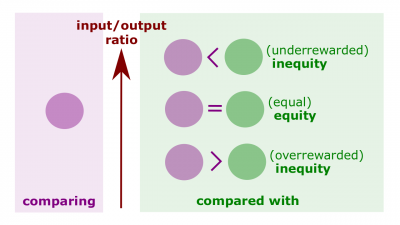Difference between revisions of "Equity theory"
(Created page with "400px|thumb|right|[[Equity theory]]Equity theory (hereinafter, the ''Theory'') is the theory that an employee compares her or his job's inpu...") |
|||
| Line 1: | Line 1: | ||
[[File:Equity-theory.png|400px|thumb|right|[[Equity theory]]]][[Equity theory]] (hereinafter, the ''Theory'') is the [[theory]] that an employee compares her or his job's input-outcomes ratio with that of relevant others and then corrects any inequity. | [[File:Equity-theory.png|400px|thumb|right|[[Equity theory]]]][[Equity theory]] (hereinafter, the ''Theory'') is the [[theory]] that an employee compares her or his job's input-outcomes ratio with that of relevant others and then corrects any inequity. | ||
| + | |||
| + | ==Definitions== | ||
| + | According to [[Organizational Behavior by Robbins and Judge (17th edition)]], | ||
| + | :[[Equity theory]]. A theory that says that individuals compare their job inputs and outcomes with those of others and then respond to eliminate any inequities. | ||
==Related coursework== | ==Related coursework== | ||
Revision as of 05:06, 26 November 2018
Equity theory (hereinafter, the Theory) is the theory that an employee compares her or his job's input-outcomes ratio with that of relevant others and then corrects any inequity.
Definitions
According to Organizational Behavior by Robbins and Judge (17th edition),
- Equity theory. A theory that says that individuals compare their job inputs and outcomes with those of others and then respond to eliminate any inequities.
